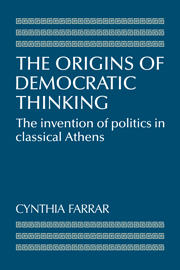Book contents
- Frontmatter
- Contents
- Dedication
- Preface
- 1 Ancient reflections: a force for us
- 2 Order in autonomy: the ungoverned cosmos and the democratic community
- 3 Protagoras: measuring man
- 4 Man's measurings: cosmos and community
- 5 Thucydides: reflecting history – man and the community
- 6 Democritus: reflecting man – the individual and the cosmos
- 7 Living democracy?
- Bibliography
- Indexes
7 - Living democracy?
Published online by Cambridge University Press: 23 October 2009
- Frontmatter
- Contents
- Dedication
- Preface
- 1 Ancient reflections: a force for us
- 2 Order in autonomy: the ungoverned cosmos and the democratic community
- 3 Protagoras: measuring man
- 4 Man's measurings: cosmos and community
- 5 Thucydides: reflecting history – man and the community
- 6 Democritus: reflecting man – the individual and the cosmos
- 7 Living democracy?
- Bibliography
- Indexes
Summary
To secure order, Plato and Aristotle turned away from the politics of democracy. The alienation, conflict and narrow self-concern charted by Thucydides and confronted by Democritus prompted Plato to bind the pursuit of the good to the existence of a stable, unified, hierarchical society, the earthly embodiment of a cosmic order. For Plato as for Democritus, the disintegration of community provoked a heightened concern with matters of justice. Justice is remedial; it comes to the fore when the connection between the demands of society and the good of individuals is called into question. Democritus invoked justice in the course of arguing that men did in fact have good reason to regard the demands of civic life as binding. For Plato, it was not enough to appeal to men to see themselves as creatures of society; society itself had to be restructured so as to embody justice. To bind the individual to social order, Plato rejected the very basis of politics, namely autonomy.
Aristotle, responding both to Plato and to the diminished unity and homogeneity of the fourth-century polis and a widening gap between rich and poor, sought to preserve the bond between individual and society from the other direction: instead of violating man's autonomy by extending the grip of the polis, he fortified the ordering power of autonomous political interaction by restricting the range of the polis itself.
- Type
- Chapter
- Information
- The Origins of Democratic ThinkingThe Invention of Politics in Classical Athens, pp. 265 - 278Publisher: Cambridge University PressPrint publication year: 1988

